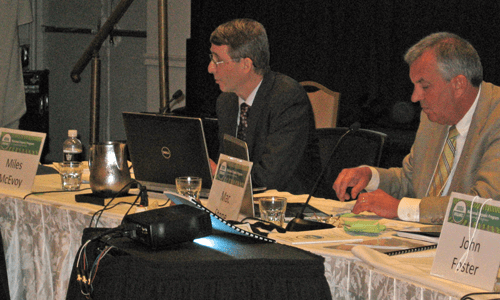By Will Fantle

The USDA’s National Organic Program (NOP) held the first of what they described as a series of listening sessions on the afternoon of Thursday, October 16. Following introductory remarks from Deputy Administrator Miles McEvoy, who oversees NOP operations, the teleconference session was turned over to participants on the call who were given three minutes to provide feedback to the NOP.
Ten people chimed in and, despite repeated requests for more participation, the call – scheduled to last two hours – was adjourned after approximately 45 minutes. Of those callers who did share perspectives with the NOP, most were harshly critical of the recent controversial changes imposed by the USDA to the National Organic Standards Board’s authority and governance.
In particular, callers zeroed in on the USDA’s changes to “sunset” and the higher threshold now required for removal of synthetic and non-organic materials from what had been presumed to be their temporary use in organics. Following is a short synopsis of what callers said:
- Alexis Baden Meyer, the Organic Consumer Association’s Political Director, condemned the sunset changes and indicated that there was “no chance” that organic standards would get better, but instead would “get worse.” She pointed to corporate power as a major concern.
- Terry Shistar [Beyond Pesticides] told the NOP that “we can’t trust you.” She criticized the “autocratic system” that has been put in place and the “overthrow” of NOSB governance. Sunset must mean sunset, she added.
- Sam Welsch [Director of certifier OneCert] expressed his belief that sunset materials expire on a particular date unless reauthorized, a dramatic difference from the new process. He also sharply criticized the NOP for allowing hydroponic operations to be declared organic – despite the lack of a soil system for the growing of the crops and a recommendation from the NOSB that this approach does not qualify as organic.
- As for myself (I identified as Cornucopia’s Codirector), I asked Miles McEvoy to respond directly to a couple of questions. One concerned why there was no consultation with the organic community and stakeholders prior to the release of their September 2013 memo changing NOSB governance and authority; the second asked why hold the listening session now, after the fact, and after all the blowback against these changes from consumers, farmers, organizations, former NOSB chairs and members of Congress. McEvoy declined to comment, responding that they would address issues raised in the listening session at the upcoming NOSB meeting later this month.
- Charlotte Vallaeys, of Consumers Union, also criticized the changes to the sunset process. She mentioned that Consumers Union was downgrading the organic label from their highest consumer guidance category to the next level down, “meaningful.” She mentioned their ongoing concern over the use of synthetics in organic food and the lack of true outdoor access for egg laying hens as part of the reasons for the reduction.
- Alan Peterson was another caller expressing concerns over sunset changes and footdragging at the USDA.
- Dennis Weaver (web journalist/organic advocate) said that the “unilaterally revised” sunset rule strikes at the very heart of consumer trust. “Reverse it,” he advised, “and bring some calm and trust back to the organic community and consumers.”
- Dag Falck, of cereal manufacturer Nature’s Path, thanked the USDA for the opportunity to comment and also noted his company’s concern with sunset changes.
- The last commenter was Kelly Shea, who described herself as someone who has worked in organic agriculture for 20 years helping to “transition farmers.” What Shea failed to mention was her longstanding employment as “vice president of Government & Industry Relations” at Dean Foods (now WhiteWave Foods) and longtime board member of the powerful industry lobby, the Organic Trade Association. Shea was the only caller to express support for the USDA’s changes to sunset.
In his opening remarks, Miles McEvoy noted that the agency’s revisions to the NOSB’s charter (a charter is required of all USDA advisory boards) caused “confusion” with a new inclusion, for the first time, of an expiration date to the congressionally created NOSB charter. The charter has been challenged formally at the USDA for this and other reasons by 20 signatories to a legal petition, including Beyond Pesticides, the Center for Food Safety and The Cornucopia Institute. McEvoy said it was the charter that will expire, in 2016, and it requires renewal.
McEvoy also addressed what he described as “confusion” regarding the role of the Designated Federal Officer for the NOSB. That official, which every one of the 150+ USDA advisory boards has, is charged with calling meetings to order, confirming the agenda, and closing the meeting. He indicated that this official could “under certain conditions” chair the meeting. (His co-chairing of last spring’s NOSB meeting sparked considerable criticism.) McEvoy indicated that the “chair” of the NOSB is member Jean Richardson. What the special circumstances might be that would place him in the role of chair went unaddressed.
It should be noted that the Organic Foods Production Act of 1990, the enabling legislation that created the NOSB and gave the board specific statutory power, clearly indicated that the board chair would be elected by the NOSB. Any rules that the USDA uses to maintain FACA (Federal Advisory Committee Act) boards has to, legally, be subordinate to the mandates of Congress in this matter. Congress indicated no “certain circumstances” in which a USDA staff member can hijack the authority of the elected board chair.
While this listening session was designed to solicit feedback on the NOSB, future sessions McEvoy noted would address other topics.
Addendum:
Since Kelly Shea did not identify herself as a one-time executive of Dean Foods, and now the spun-off WhiteWave division, we’ve included the excerpt below from our upcoming report on yogurt, Culture Wars, to describe some of her successes as a key advocate for the organic movement (or at least for her employer).
Dean Foods/WhiteWave: Gaming the Organic System
[Excerpted from Cornucopia’s upcoming Yogurt Report, Culture Wars]
 As it turns out, the executives and lobbyists of $12 billion food giant Dean Foods, which owned the Horizon brand at the time, played an instrumental role in pushing for the approval of fructooligosaccharides (FOS) in organics. Horizon is now controlled by Dean’s spin-off, WhiteWave Foods.
As it turns out, the executives and lobbyists of $12 billion food giant Dean Foods, which owned the Horizon brand at the time, played an instrumental role in pushing for the approval of fructooligosaccharides (FOS) in organics. Horizon is now controlled by Dean’s spin-off, WhiteWave Foods.
When the National Organic Standards Board (NOSB) reviewed the petition for neosugar in 2007, the word “neosugar” did not appear on the petition; it was referred to exclusively as “shortchain fructooligosaccharides.” The initial subcommittee voted 1 in favor and 4 against, approving the use of neosugar in organics in March 2007.
The committee recognized that “the substance is used for a value-added quality and is not essential for [the] final product.” Their primary concern, however, was with the French study showing flatulence and diarrhea in humans given neosugar, which had been pointed out to NOSB members in a technical review.
When this decision became public, Dean Foods’ lobbyists promptly got to work to ensure the full NOSB would approve the petition at its meeting the following month, in April 2007.
At the meeting, Dean Foods Vice President Kelly Shea and several executives with GTC Nutrition, the manufacturer of Nutraflora® neosugar, convinced enough NOSB members to vote in favor of the petition. Although it did not add neosugar to its products, Organic Valley’s representative at the meeting also urged the board to approve its use.
Shea argued that fructooligosaccharides “are fully consistent with organic principles and organic values.” There was no discussion of the pesticides used to grow conventional sugar beets and sugar cane used as the starting material for neosugar. Growers of sugar beets even treat seed with neonicotinoid pesticides, which are toxic to honeybees and implicated in the declining populations of these important pollinators. Honeybees are integral to the health of our food system, responsible for pollinating one in three mouthfuls of food.
And while there was much boasting about neosugar’s beneficial effects on human health, the corporate executives never mentioned the studies showing flatulence and other negative effects from consuming neosugar.
One dissenting NOSB member, Bea James, pointed out after the presentation of one of the GTC Nutrition executives: “You didn’t mention anything about the possible side effects of FOS, and I know that some people do have a negative reaction in their digestion.” James also stated, “I think that the side effects of a poor diet are not necessarily the responsibility of organic agriculture or products.” But in the end, 10 NOSB members voted to approve neosugar for use in organics, with only three dissenting votes (two board members were absent).
The final NOSB recommendation stated: “It was agreed that certain agricultural materials might be essential for creating a product that meets consumer expectations of taste or texture or nutritional value. A number of commenters cited fructooligosaccharide as an essential ingredient in the organic consumer products they make for this reason.”
Horizon’s Fat Free and Cream on Top yogurt brands identify fructooligosaccharide on their ingredients labels as “Fructan.”

